Access to Higher Education Biology: Stress and Personality Research
VerifiedAdded on 2020/04/07
|11
|3543
|372
Homework Assignment
AI Summary
This Biology research proposal investigates the relationship between personality types (A and B) and their responses to stress, including coping mechanisms. The student's assignment outlines the theoretical framework, rationale, and objectives of the research, referencing key studies on personality and stress-related illnesses. The proposal details a mixed-methods research design using quasi-experimental and observational approaches, including the use of questionnaires and assessment tools to measure stress and personality traits. The study aims to evaluate how different personality aspects influence stress response and identify the underlying reasoning behind these responses, focusing on university students. Ethical considerations, participant selection, materials, and procedures are also outlined, providing a comprehensive plan for the practical investigation. The research seeks to determine if type A personalities have higher coping strategies compared to type B personalities during mild stressor events. The student's work fulfills the assignment requirements, including a student declaration and a structured approach to the research process.
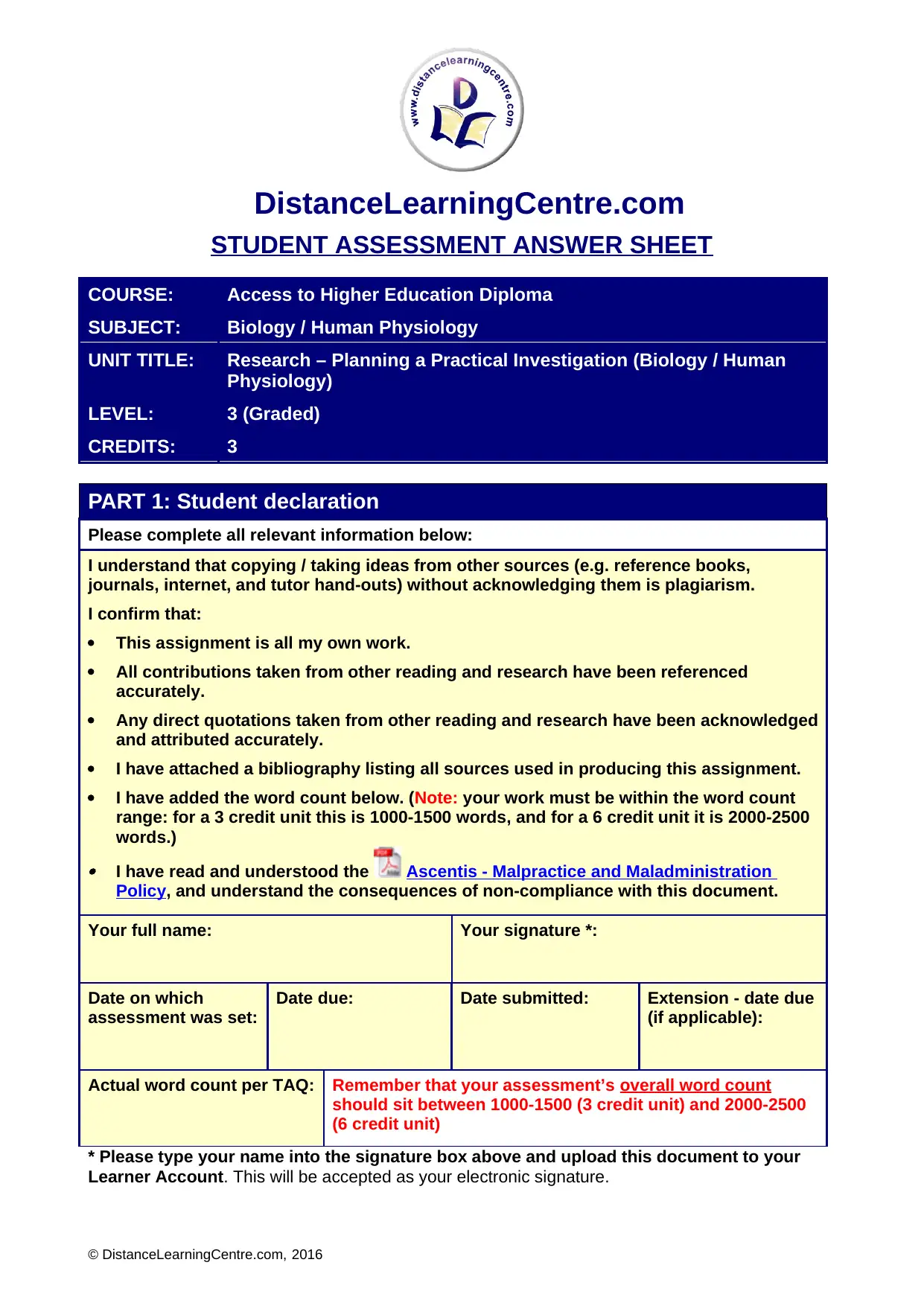
“DistanceLearningCentre.com
STUDENT ASSESSMENT ANSWER SHEET
COURSE: Access to Higher Education Diploma
SUBJECT: Biology / Human Physiology
UNIT TITLE: Research – Planning a Practical Investigation (Biology / Human
Physiology)
LEVEL: 3 (Graded)
CREDITS: 3
PART 1: Student declaration
Please complete all relevant information below:
I understand that copying / taking ideas from other sources (e.g. reference books,
journals, internet, and tutor hand-outs) without acknowledging them is plagiarism.
I confirm that:
This assignment is all my own work.
All contributions taken from other reading and research have been referenced
accurately.
Any direct quotations taken from other reading and research have been acknowledged
and attributed accurately.
I have attached a bibliography listing all sources used in producing this assignment.
I have added the word count below. (Note: your work must be within the word count
range: for a 3 credit unit this is 1000-1500 words, and for a 6 credit unit it is 2000-2500
words.)
I have read and understood the Ascentis - Malpractice and Maladministration
Policy, and understand the consequences of non-compliance with this document.
Your full name: Your signature *:
Date on which
assessment was set:
Date due: Date submitted: Extension - date due
(if applicable):
Actual word count per TAQ: Remember that your assessment’s overall word count
should sit between 1000-1500 (3 credit unit) and 2000-2500
(6 credit unit)
* Please type your name into the signature box above and upload this document to your
Learner Account. This will be accepted as your electronic signature.
© DistanceLearningCentre.com, 2016
STUDENT ASSESSMENT ANSWER SHEET
COURSE: Access to Higher Education Diploma
SUBJECT: Biology / Human Physiology
UNIT TITLE: Research – Planning a Practical Investigation (Biology / Human
Physiology)
LEVEL: 3 (Graded)
CREDITS: 3
PART 1: Student declaration
Please complete all relevant information below:
I understand that copying / taking ideas from other sources (e.g. reference books,
journals, internet, and tutor hand-outs) without acknowledging them is plagiarism.
I confirm that:
This assignment is all my own work.
All contributions taken from other reading and research have been referenced
accurately.
Any direct quotations taken from other reading and research have been acknowledged
and attributed accurately.
I have attached a bibliography listing all sources used in producing this assignment.
I have added the word count below. (Note: your work must be within the word count
range: for a 3 credit unit this is 1000-1500 words, and for a 6 credit unit it is 2000-2500
words.)
I have read and understood the Ascentis - Malpractice and Maladministration
Policy, and understand the consequences of non-compliance with this document.
Your full name: Your signature *:
Date on which
assessment was set:
Date due: Date submitted: Extension - date due
(if applicable):
Actual word count per TAQ: Remember that your assessment’s overall word count
should sit between 1000-1500 (3 credit unit) and 2000-2500
(6 credit unit)
* Please type your name into the signature box above and upload this document to your
Learner Account. This will be accepted as your electronic signature.
© DistanceLearningCentre.com, 2016
Paraphrase This Document
Need a fresh take? Get an instant paraphrase of this document with our AI Paraphraser
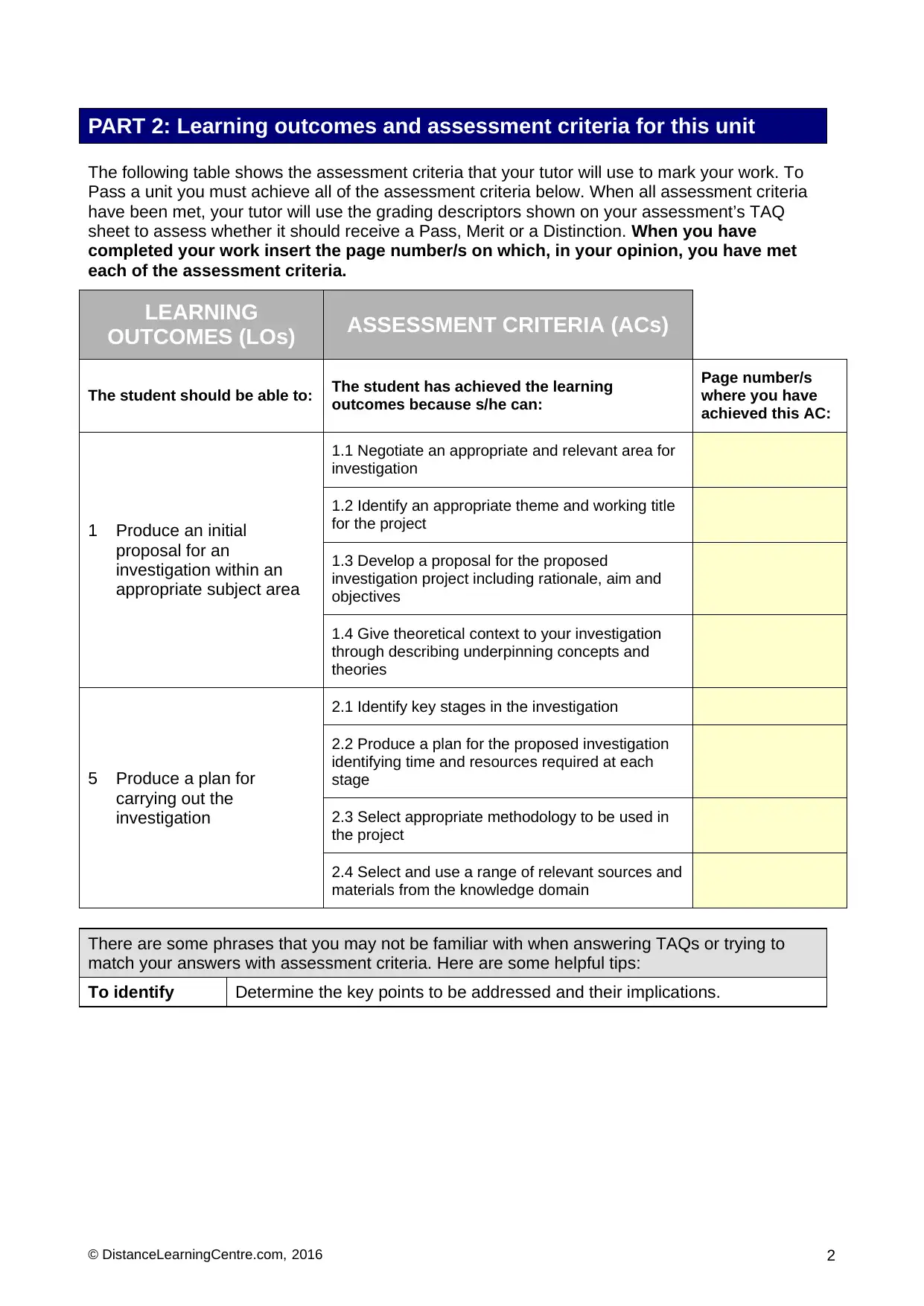
PART 2: Learning outcomes and assessment criteria for this unit
The following table shows the assessment criteria that your tutor will use to mark your work. To
Pass a unit you must achieve all of the assessment criteria below. When all assessment criteria
have been met, your tutor will use the grading descriptors shown on your assessment’s TAQ
sheet to assess whether it should receive a Pass, Merit or a Distinction. When you have
completed your work insert the page number/s on which, in your opinion, you have met
each of the assessment criteria.
LEARNING
OUTCOMES (LOs) ASSESSMENT CRITERIA (ACs)
The student should be able to: The student has achieved the learning
outcomes because s/he can:
Page number/s
where you have
achieved this AC:
1 Produce an initial
proposal for an
investigation within an
appropriate subject area
1.1 Negotiate an appropriate and relevant area for
investigation
1.2 Identify an appropriate theme and working title
for the project
1.3 Develop a proposal for the proposed
investigation project including rationale, aim and
objectives
1.4 Give theoretical context to your investigation
through describing underpinning concepts and
theories
5 Produce a plan for
carrying out the
investigation
2.1 Identify key stages in the investigation
2.2 Produce a plan for the proposed investigation
identifying time and resources required at each
stage
2.3 Select appropriate methodology to be used in
the project
2.4 Select and use a range of relevant sources and
materials from the knowledge domain
There are some phrases that you may not be familiar with when answering TAQs or trying to
match your answers with assessment criteria. Here are some helpful tips:
To identify Determine the key points to be addressed and their implications.
© DistanceLearningCentre.com, 2016 2
The following table shows the assessment criteria that your tutor will use to mark your work. To
Pass a unit you must achieve all of the assessment criteria below. When all assessment criteria
have been met, your tutor will use the grading descriptors shown on your assessment’s TAQ
sheet to assess whether it should receive a Pass, Merit or a Distinction. When you have
completed your work insert the page number/s on which, in your opinion, you have met
each of the assessment criteria.
LEARNING
OUTCOMES (LOs) ASSESSMENT CRITERIA (ACs)
The student should be able to: The student has achieved the learning
outcomes because s/he can:
Page number/s
where you have
achieved this AC:
1 Produce an initial
proposal for an
investigation within an
appropriate subject area
1.1 Negotiate an appropriate and relevant area for
investigation
1.2 Identify an appropriate theme and working title
for the project
1.3 Develop a proposal for the proposed
investigation project including rationale, aim and
objectives
1.4 Give theoretical context to your investigation
through describing underpinning concepts and
theories
5 Produce a plan for
carrying out the
investigation
2.1 Identify key stages in the investigation
2.2 Produce a plan for the proposed investigation
identifying time and resources required at each
stage
2.3 Select appropriate methodology to be used in
the project
2.4 Select and use a range of relevant sources and
materials from the knowledge domain
There are some phrases that you may not be familiar with when answering TAQs or trying to
match your answers with assessment criteria. Here are some helpful tips:
To identify Determine the key points to be addressed and their implications.
© DistanceLearningCentre.com, 2016 2
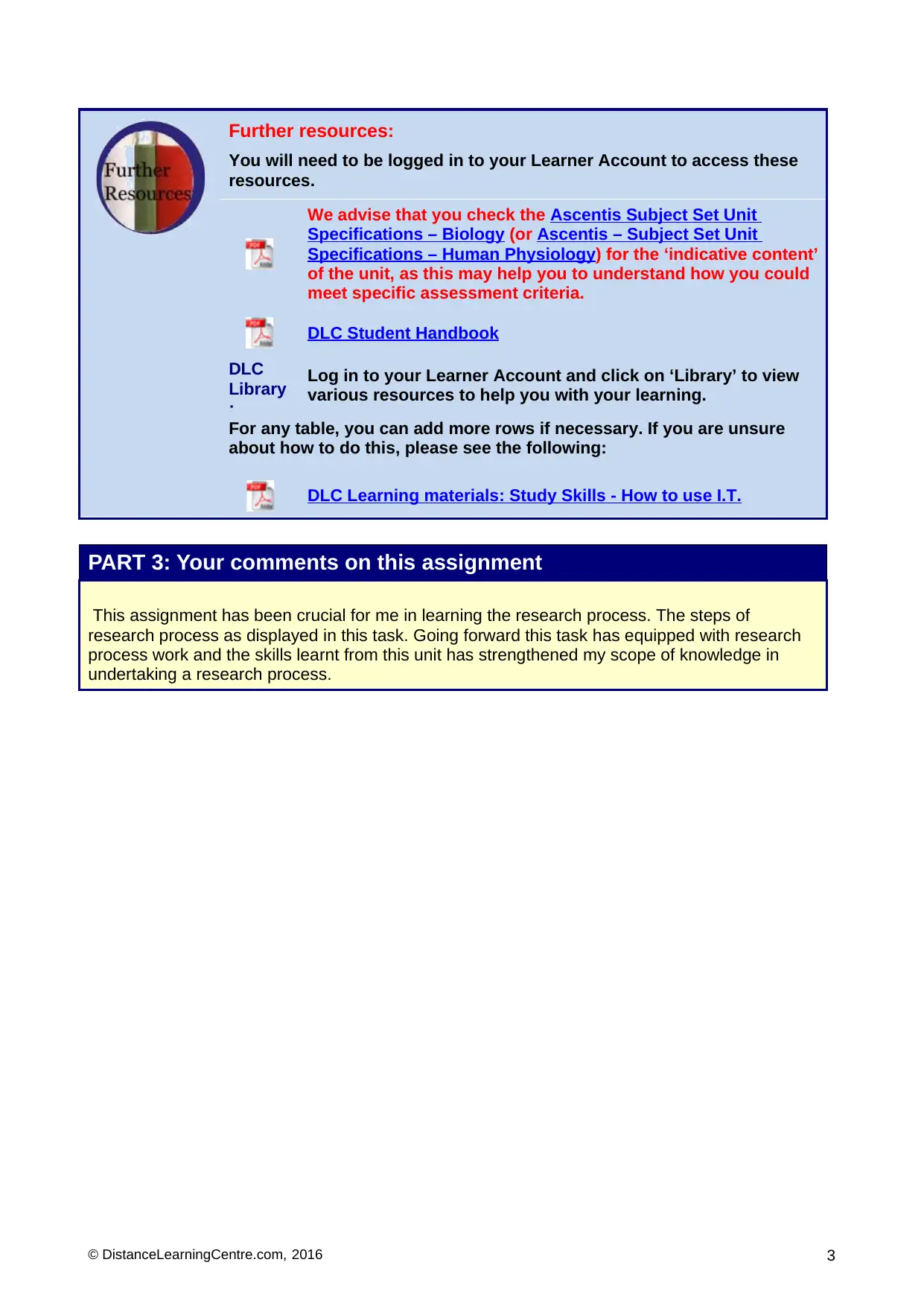
Further resources:
You will need to be logged in to your Learner Account to access these
resources.
We advise that you check the Ascentis Subject Set Unit
Specifications – Biology (or Ascentis – Subject Set Unit
Specifications – Human Physiology) for the ‘indicative content’
of the unit, as this may help you to understand how you could
meet specific assessment criteria.
DLC Student Handbook
DLC
Library
:
Log in to your Learner Account and click on ‘Library’ to view
various resources to help you with your learning.
For any table, you can add more rows if necessary. If you are unsure
about how to do this, please see the following:
DLC Learning materials: Study Skills - How to use I.T.
PART 3: Your comments on this assignment”
This assignment has been crucial for me in learning the research process. The steps of
research process as displayed in this task. Going forward this task has equipped with research
process work and the skills learnt from this unit has strengthened my scope of knowledge in
undertaking a research process.
“
© DistanceLearningCentre.com, 2016 3
You will need to be logged in to your Learner Account to access these
resources.
We advise that you check the Ascentis Subject Set Unit
Specifications – Biology (or Ascentis – Subject Set Unit
Specifications – Human Physiology) for the ‘indicative content’
of the unit, as this may help you to understand how you could
meet specific assessment criteria.
DLC Student Handbook
DLC
Library
:
Log in to your Learner Account and click on ‘Library’ to view
various resources to help you with your learning.
For any table, you can add more rows if necessary. If you are unsure
about how to do this, please see the following:
DLC Learning materials: Study Skills - How to use I.T.
PART 3: Your comments on this assignment”
This assignment has been crucial for me in learning the research process. The steps of
research process as displayed in this task. Going forward this task has equipped with research
process work and the skills learnt from this unit has strengthened my scope of knowledge in
undertaking a research process.
“
© DistanceLearningCentre.com, 2016 3
⊘ This is a preview!⊘
Do you want full access?
Subscribe today to unlock all pages.

Trusted by 1+ million students worldwide
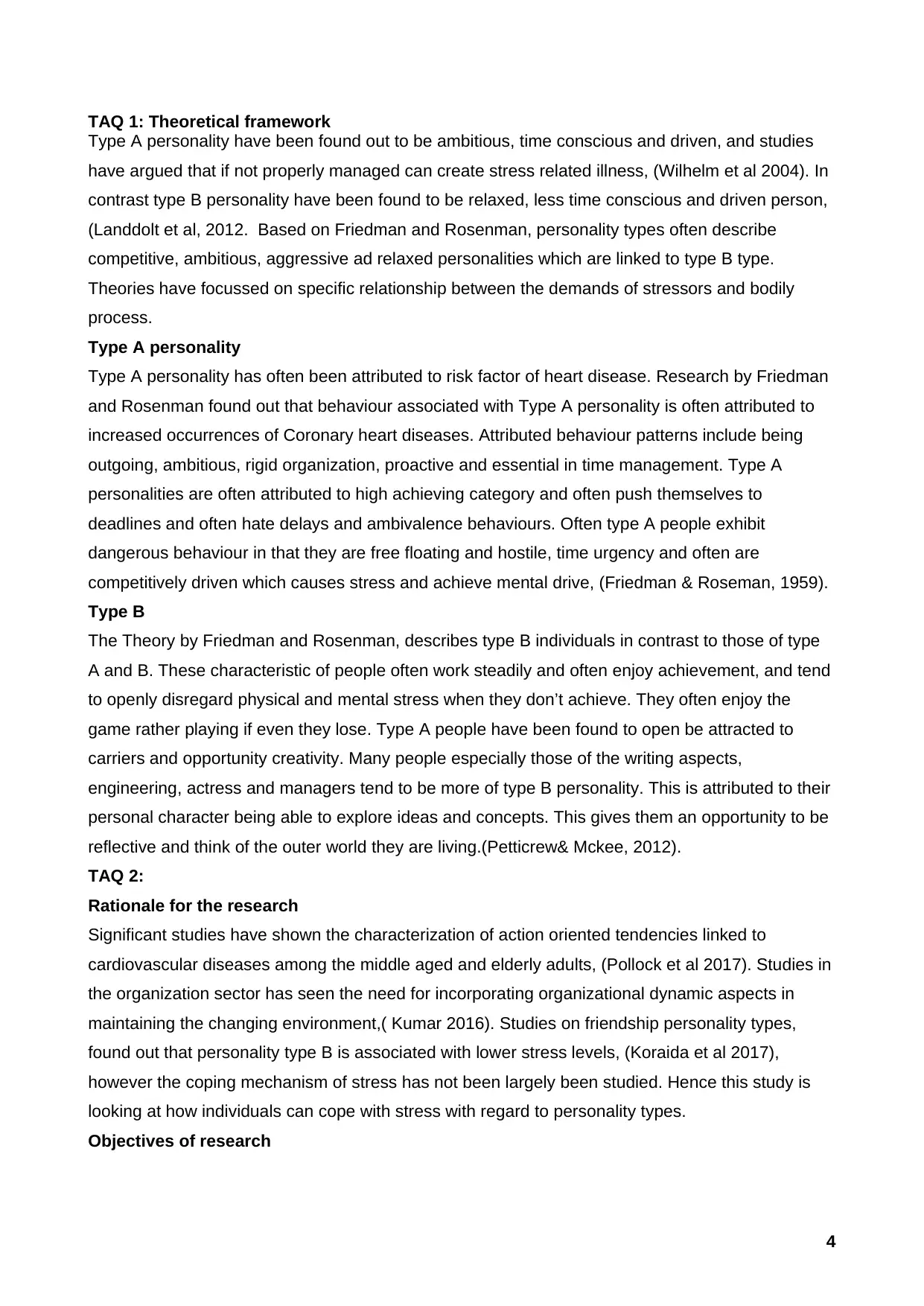
TAQ 1: Theoretical framework
Type A personality have been found out to be ambitious, time conscious and driven, and studies
have argued that if not properly managed can create stress related illness, (Wilhelm et al 2004). In
contrast type B personality have been found to be relaxed, less time conscious and driven person,
(Landdolt et al, 2012. Based on Friedman and Rosenman, personality types often describe
competitive, ambitious, aggressive ad relaxed personalities which are linked to type B type.
Theories have focussed on specific relationship between the demands of stressors and bodily
process.
Type A personality
Type A personality has often been attributed to risk factor of heart disease. Research by Friedman
and Rosenman found out that behaviour associated with Type A personality is often attributed to
increased occurrences of Coronary heart diseases. Attributed behaviour patterns include being
outgoing, ambitious, rigid organization, proactive and essential in time management. Type A
personalities are often attributed to high achieving category and often push themselves to
deadlines and often hate delays and ambivalence behaviours. Often type A people exhibit
dangerous behaviour in that they are free floating and hostile, time urgency and often are
competitively driven which causes stress and achieve mental drive, (Friedman & Roseman, 1959).
Type B
The Theory by Friedman and Rosenman, describes type B individuals in contrast to those of type
A and B. These characteristic of people often work steadily and often enjoy achievement, and tend
to openly disregard physical and mental stress when they don’t achieve. They often enjoy the
game rather playing if even they lose. Type A people have been found to open be attracted to
carriers and opportunity creativity. Many people especially those of the writing aspects,
engineering, actress and managers tend to be more of type B personality. This is attributed to their
personal character being able to explore ideas and concepts. This gives them an opportunity to be
reflective and think of the outer world they are living.(Petticrew& Mckee, 2012).
TAQ 2:
Rationale for the research
Significant studies have shown the characterization of action oriented tendencies linked to
cardiovascular diseases among the middle aged and elderly adults, (Pollock et al 2017). Studies in
the organization sector has seen the need for incorporating organizational dynamic aspects in
maintaining the changing environment,( Kumar 2016). Studies on friendship personality types,
found out that personality type B is associated with lower stress levels, (Koraida et al 2017),
however the coping mechanism of stress has not been largely been studied. Hence this study is
looking at how individuals can cope with stress with regard to personality types.
Objectives of research
4
Type A personality have been found out to be ambitious, time conscious and driven, and studies
have argued that if not properly managed can create stress related illness, (Wilhelm et al 2004). In
contrast type B personality have been found to be relaxed, less time conscious and driven person,
(Landdolt et al, 2012. Based on Friedman and Rosenman, personality types often describe
competitive, ambitious, aggressive ad relaxed personalities which are linked to type B type.
Theories have focussed on specific relationship between the demands of stressors and bodily
process.
Type A personality
Type A personality has often been attributed to risk factor of heart disease. Research by Friedman
and Rosenman found out that behaviour associated with Type A personality is often attributed to
increased occurrences of Coronary heart diseases. Attributed behaviour patterns include being
outgoing, ambitious, rigid organization, proactive and essential in time management. Type A
personalities are often attributed to high achieving category and often push themselves to
deadlines and often hate delays and ambivalence behaviours. Often type A people exhibit
dangerous behaviour in that they are free floating and hostile, time urgency and often are
competitively driven which causes stress and achieve mental drive, (Friedman & Roseman, 1959).
Type B
The Theory by Friedman and Rosenman, describes type B individuals in contrast to those of type
A and B. These characteristic of people often work steadily and often enjoy achievement, and tend
to openly disregard physical and mental stress when they don’t achieve. They often enjoy the
game rather playing if even they lose. Type A people have been found to open be attracted to
carriers and opportunity creativity. Many people especially those of the writing aspects,
engineering, actress and managers tend to be more of type B personality. This is attributed to their
personal character being able to explore ideas and concepts. This gives them an opportunity to be
reflective and think of the outer world they are living.(Petticrew& Mckee, 2012).
TAQ 2:
Rationale for the research
Significant studies have shown the characterization of action oriented tendencies linked to
cardiovascular diseases among the middle aged and elderly adults, (Pollock et al 2017). Studies in
the organization sector has seen the need for incorporating organizational dynamic aspects in
maintaining the changing environment,( Kumar 2016). Studies on friendship personality types,
found out that personality type B is associated with lower stress levels, (Koraida et al 2017),
however the coping mechanism of stress has not been largely been studied. Hence this study is
looking at how individuals can cope with stress with regard to personality types.
Objectives of research
4
Paraphrase This Document
Need a fresh take? Get an instant paraphrase of this document with our AI Paraphraser
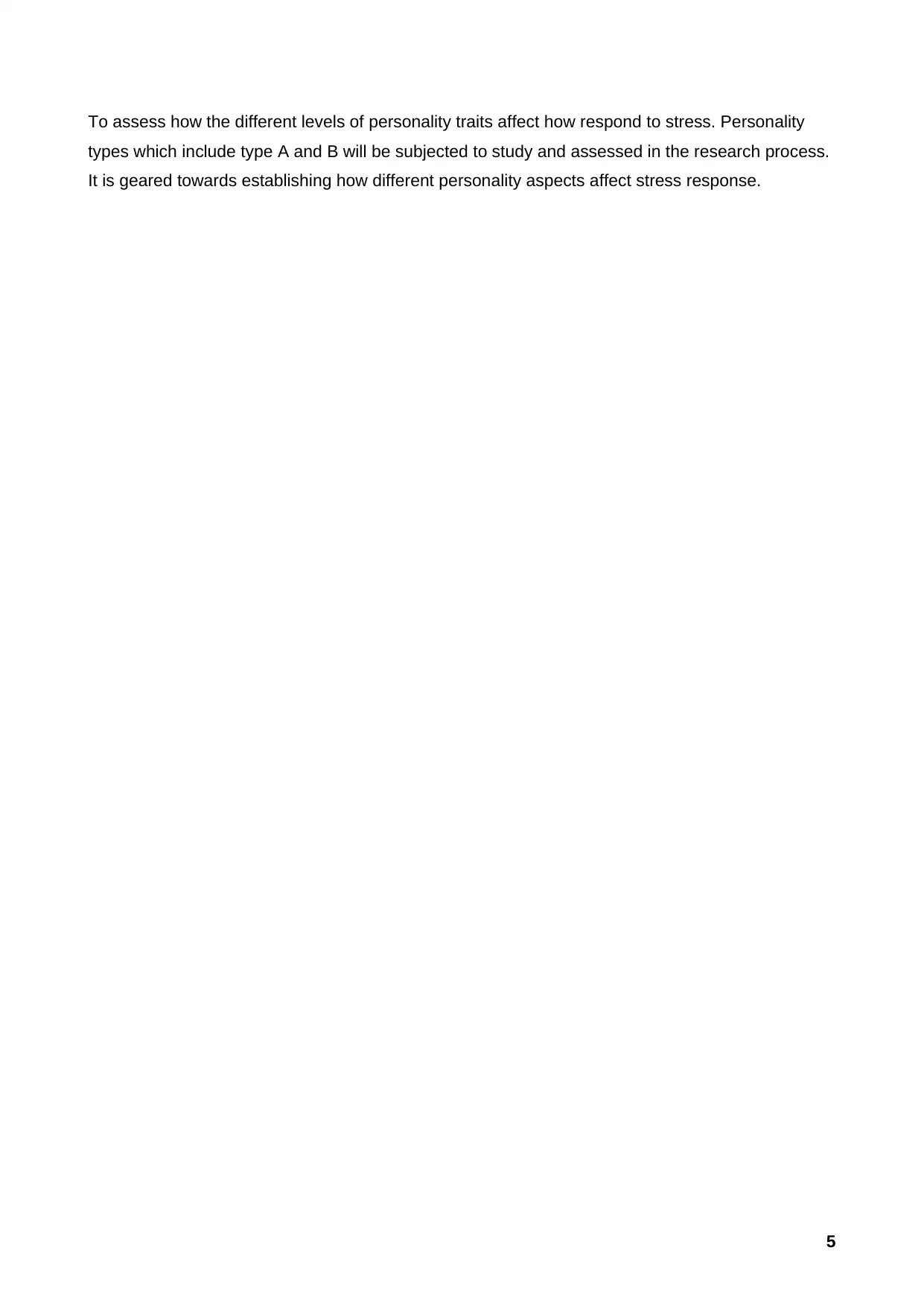
To assess how the different levels of personality traits affect how respond to stress. Personality
types which include type A and B will be subjected to study and assessed in the research process.
It is geared towards establishing how different personality aspects affect stress response.
5
types which include type A and B will be subjected to study and assessed in the research process.
It is geared towards establishing how different personality aspects affect stress response.
5
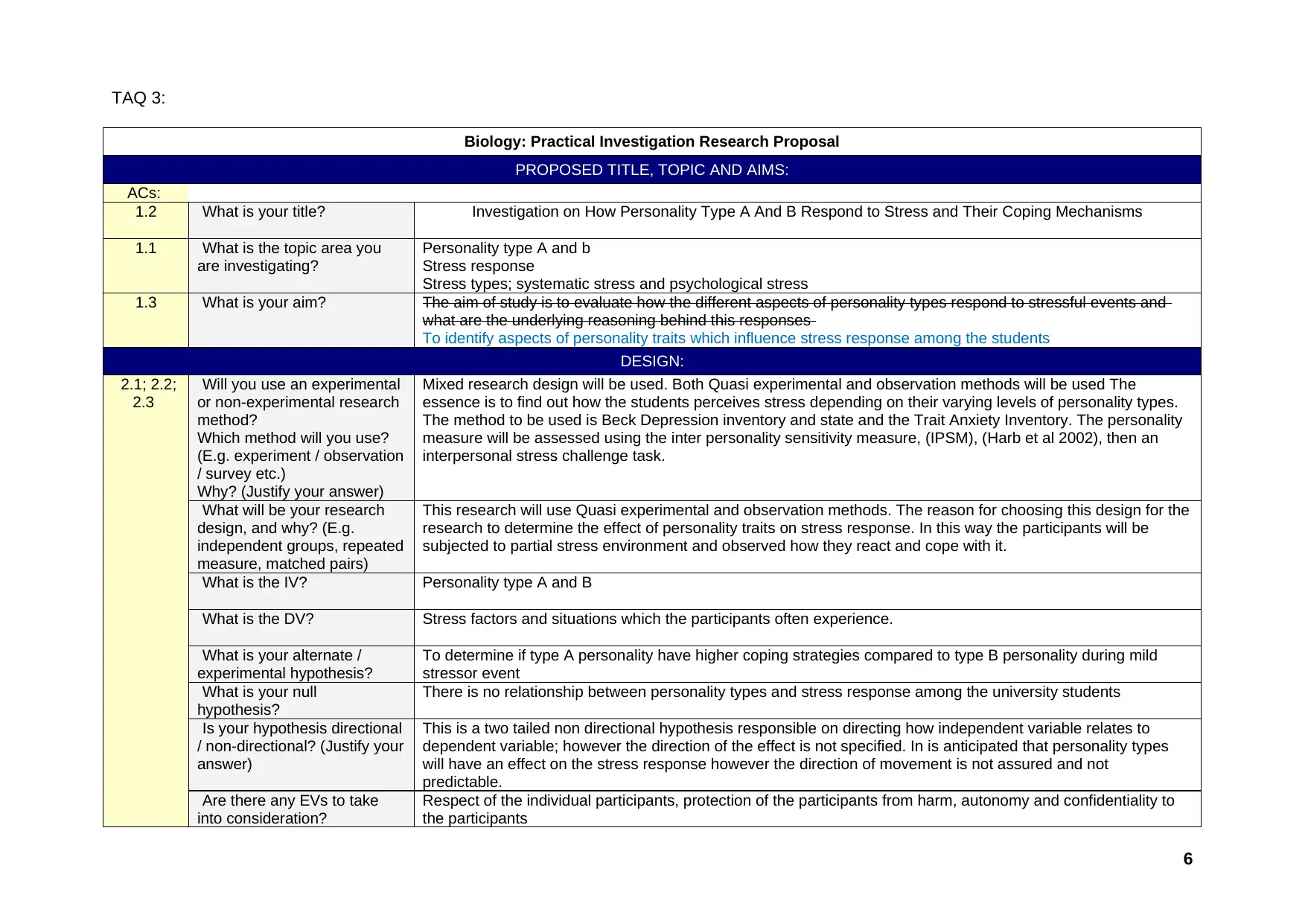
TAQ 3:
“Biology: Practical Investigation Research Proposal”
“PROPOSED TITLE, TOPIC AND AIMS:”
“ACs: ”
“1.2” “What is your title?” Investigation on How Personality Type A And B Respond to Stress and Their Coping Mechanisms
“1.1” “What is the topic area you
are investigating?”
Personality type A and b
Stress response
Stress types; systematic stress and psychological stress
“1.3” “What is your aim?” The aim of study is to evaluate how the different aspects of personality types respond to stressful events and
what are the underlying reasoning behind this responses
To identify aspects of personality traits which influence stress response among the students
“DESIGN:”
“2.1; 2.2;
2.3”
“Will you use an experimental
or non-experimental research
method?
Which method will you use?
(E.g. experiment / observation
/ survey etc.)
Why? (Justify your answer)”
Mixed research design will be used. Both Quasi experimental and observation methods will be used The
essence is to find out how the students perceives stress depending on their varying levels of personality types.
The method to be used is Beck Depression inventory and state and the Trait Anxiety Inventory. The personality
measure will be assessed using the inter personality sensitivity measure, (IPSM), (Harb et al 2002), then an
interpersonal stress challenge task.
“What will be your research
design, and why? (E.g.
independent groups, repeated
measure, matched pairs)”
This research will use Quasi experimental and observation methods. The reason for choosing this design for the
research to determine the effect of personality traits on stress response. In this way the participants will be
subjected to partial stress environment and observed how they react and cope with it.
“What is the IV?” Personality type A and B
“What is the DV?” Stress factors and situations which the participants often experience.
“What is your alternate /
experimental hypothesis?”
To determine if type A personality have higher coping strategies compared to type B personality during mild
stressor event
“What is your null
hypothesis?”
There is no relationship between personality types and stress response among the university students
“Is your hypothesis directional
/ non-directional? (Justify your
answer)”
This is a two tailed non directional hypothesis responsible on directing how independent variable relates to
dependent variable; however the direction of the effect is not specified. In is anticipated that personality types
will have an effect on the stress response however the direction of movement is not assured and not
predictable.
“Are there any EVs to take
into consideration?”
Respect of the individual participants, protection of the participants from harm, autonomy and confidentiality to
the participants
6
“Biology: Practical Investigation Research Proposal”
“PROPOSED TITLE, TOPIC AND AIMS:”
“ACs: ”
“1.2” “What is your title?” Investigation on How Personality Type A And B Respond to Stress and Their Coping Mechanisms
“1.1” “What is the topic area you
are investigating?”
Personality type A and b
Stress response
Stress types; systematic stress and psychological stress
“1.3” “What is your aim?” The aim of study is to evaluate how the different aspects of personality types respond to stressful events and
what are the underlying reasoning behind this responses
To identify aspects of personality traits which influence stress response among the students
“DESIGN:”
“2.1; 2.2;
2.3”
“Will you use an experimental
or non-experimental research
method?
Which method will you use?
(E.g. experiment / observation
/ survey etc.)
Why? (Justify your answer)”
Mixed research design will be used. Both Quasi experimental and observation methods will be used The
essence is to find out how the students perceives stress depending on their varying levels of personality types.
The method to be used is Beck Depression inventory and state and the Trait Anxiety Inventory. The personality
measure will be assessed using the inter personality sensitivity measure, (IPSM), (Harb et al 2002), then an
interpersonal stress challenge task.
“What will be your research
design, and why? (E.g.
independent groups, repeated
measure, matched pairs)”
This research will use Quasi experimental and observation methods. The reason for choosing this design for the
research to determine the effect of personality traits on stress response. In this way the participants will be
subjected to partial stress environment and observed how they react and cope with it.
“What is the IV?” Personality type A and B
“What is the DV?” Stress factors and situations which the participants often experience.
“What is your alternate /
experimental hypothesis?”
To determine if type A personality have higher coping strategies compared to type B personality during mild
stressor event
“What is your null
hypothesis?”
There is no relationship between personality types and stress response among the university students
“Is your hypothesis directional
/ non-directional? (Justify your
answer)”
This is a two tailed non directional hypothesis responsible on directing how independent variable relates to
dependent variable; however the direction of the effect is not specified. In is anticipated that personality types
will have an effect on the stress response however the direction of movement is not assured and not
predictable.
“Are there any EVs to take
into consideration?”
Respect of the individual participants, protection of the participants from harm, autonomy and confidentiality to
the participants
6
⊘ This is a preview!⊘
Do you want full access?
Subscribe today to unlock all pages.

Trusted by 1+ million students worldwide
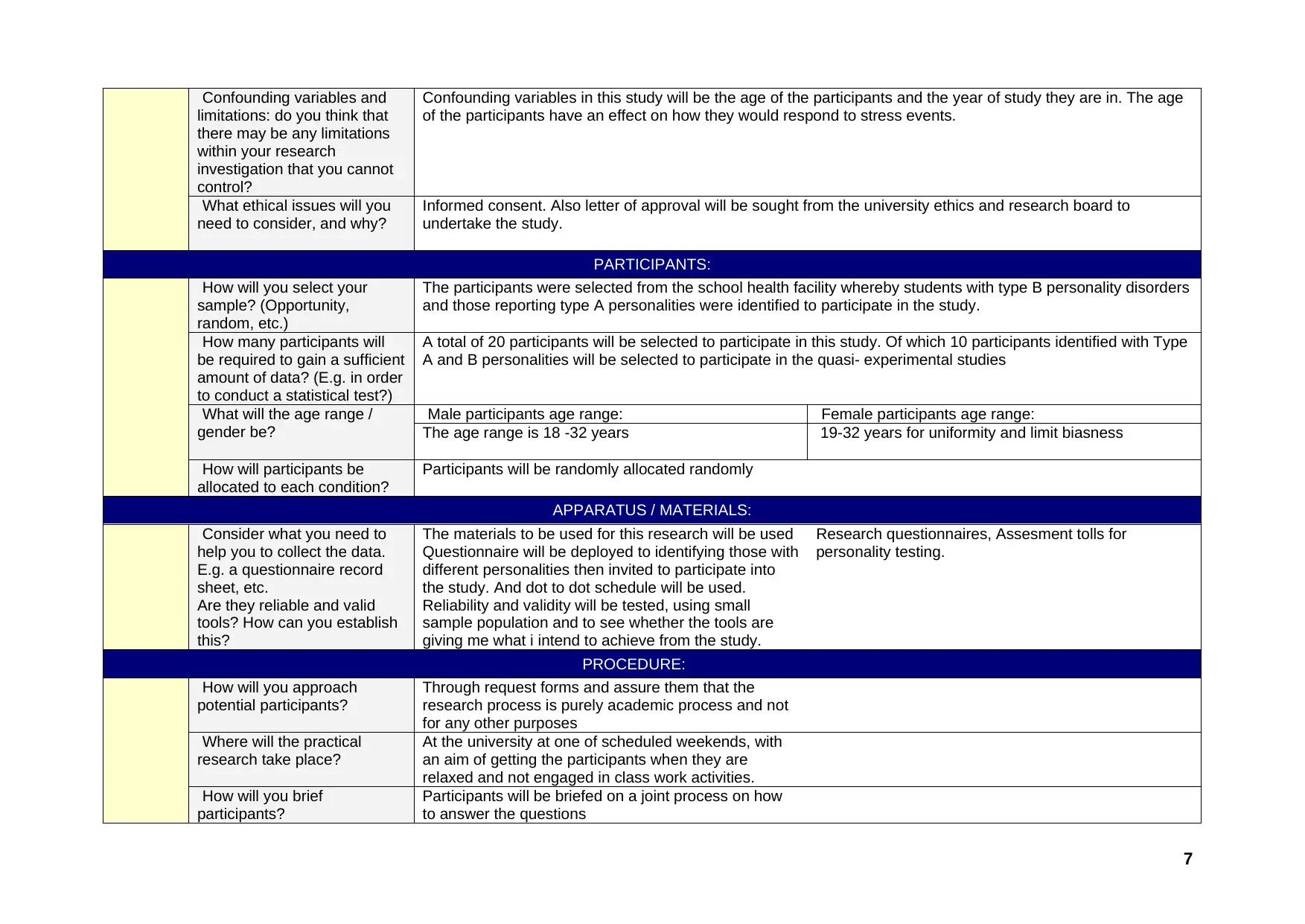
“Confounding variables and
limitations: do you think that
there may be any limitations
within your research
investigation that you cannot
control?”
Confounding variables in this study will be the age of the participants and the year of study they are in. The age
of the participants have an effect on how they would respond to stress events.
“What ethical issues will you
need to consider, and why?”
Informed consent. Also letter of approval will be sought from the university ethics and research board to
undertake the study.
“PARTICIPANTS:”
“How will you select your
sample? (Opportunity,
random, etc.)”
The participants were selected from the school health facility whereby students with type B personality disorders
and those reporting type A personalities were identified to participate in the study.
“How many participants will
be required to gain a sufficient
amount of data? (E.g. in order
to conduct a statistical test?)”
A total of 20 participants will be selected to participate in this study. Of which 10 participants identified with Type
A and B personalities will be selected to participate in the quasi- experimental studies
“What will the age range /
gender be?”
“Male participants age range:” “Female participants age range:”
The age range is 18 -32 years 19-32 years for uniformity and limit biasness
“How will participants be
allocated to each condition?”
Participants will be randomly allocated randomly
“APPARATUS / MATERIALS:”
“Consider what you need to
help you to collect the data.
E.g. a questionnaire record
sheet, etc.
Are they reliable and valid
tools? How can you establish
this?”
The materials to be used for this research will be used
Questionnaire will be deployed to identifying those with
different personalities then invited to participate into
the study. And dot to dot schedule will be used.
Reliability and validity will be tested, using small
sample population and to see whether the tools are
giving me what i intend to achieve from the study.
Research questionnaires, Assesment tolls for
personality testing.
“PROCEDURE:”
“How will you approach
potential participants?”
Through request forms and assure them that the
research process is purely academic process and not
for any other purposes
“Where will the practical
research take place?”
At the university at one of scheduled weekends, with
an aim of getting the participants when they are
relaxed and not engaged in class work activities.
“How will you brief
participants?”
Participants will be briefed on a joint process on how
to answer the questions
7
limitations: do you think that
there may be any limitations
within your research
investigation that you cannot
control?”
Confounding variables in this study will be the age of the participants and the year of study they are in. The age
of the participants have an effect on how they would respond to stress events.
“What ethical issues will you
need to consider, and why?”
Informed consent. Also letter of approval will be sought from the university ethics and research board to
undertake the study.
“PARTICIPANTS:”
“How will you select your
sample? (Opportunity,
random, etc.)”
The participants were selected from the school health facility whereby students with type B personality disorders
and those reporting type A personalities were identified to participate in the study.
“How many participants will
be required to gain a sufficient
amount of data? (E.g. in order
to conduct a statistical test?)”
A total of 20 participants will be selected to participate in this study. Of which 10 participants identified with Type
A and B personalities will be selected to participate in the quasi- experimental studies
“What will the age range /
gender be?”
“Male participants age range:” “Female participants age range:”
The age range is 18 -32 years 19-32 years for uniformity and limit biasness
“How will participants be
allocated to each condition?”
Participants will be randomly allocated randomly
“APPARATUS / MATERIALS:”
“Consider what you need to
help you to collect the data.
E.g. a questionnaire record
sheet, etc.
Are they reliable and valid
tools? How can you establish
this?”
The materials to be used for this research will be used
Questionnaire will be deployed to identifying those with
different personalities then invited to participate into
the study. And dot to dot schedule will be used.
Reliability and validity will be tested, using small
sample population and to see whether the tools are
giving me what i intend to achieve from the study.
Research questionnaires, Assesment tolls for
personality testing.
“PROCEDURE:”
“How will you approach
potential participants?”
Through request forms and assure them that the
research process is purely academic process and not
for any other purposes
“Where will the practical
research take place?”
At the university at one of scheduled weekends, with
an aim of getting the participants when they are
relaxed and not engaged in class work activities.
“How will you brief
participants?”
Participants will be briefed on a joint process on how
to answer the questions
7
Paraphrase This Document
Need a fresh take? Get an instant paraphrase of this document with our AI Paraphraser
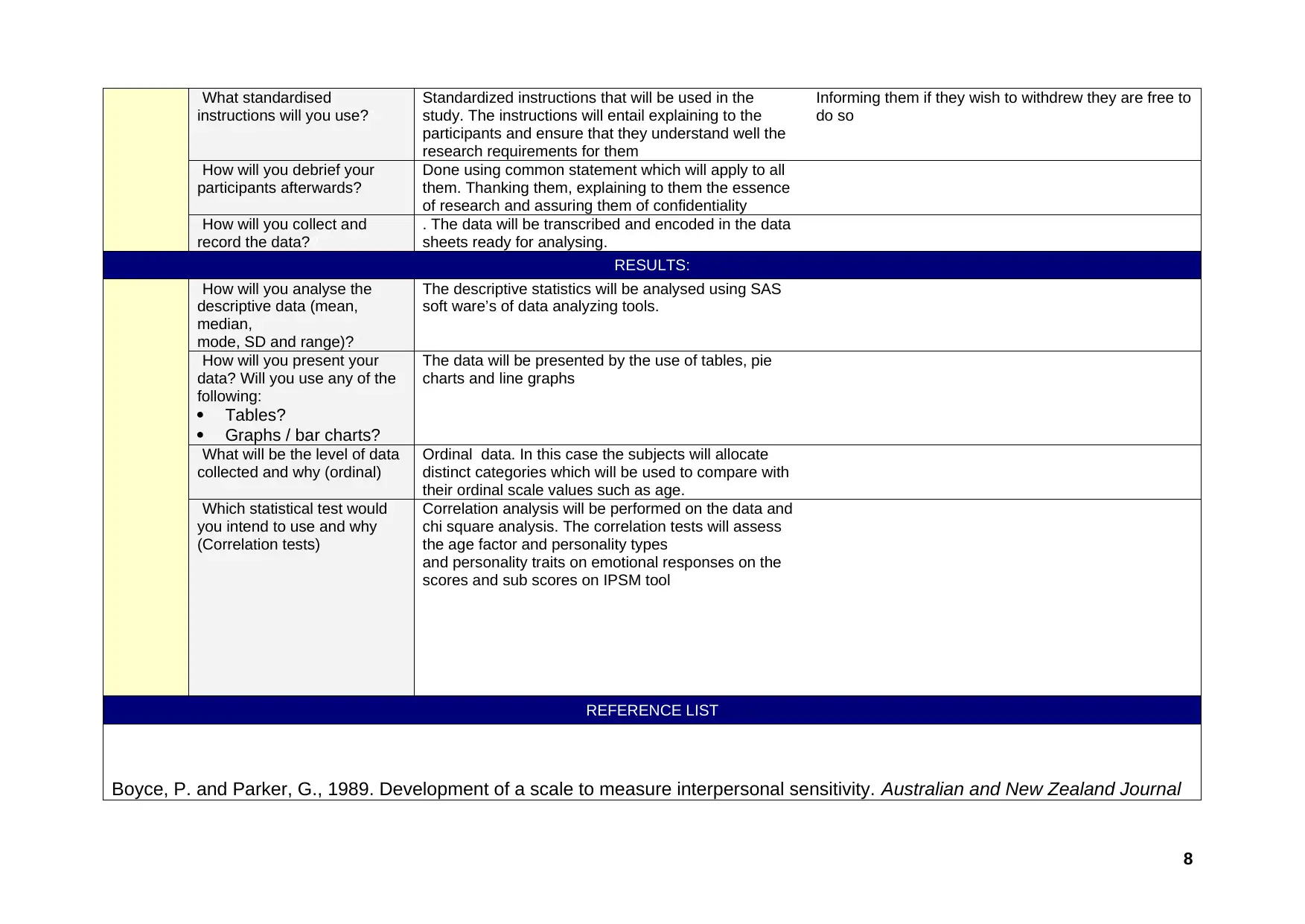
“What standardised
instructions will you use?”
Standardized instructions that will be used in the
study. The instructions will entail explaining to the
participants and ensure that they understand well the
research requirements for them
Informing them if they wish to withdrew they are free to
do so
“How will you debrief your
participants afterwards?”
Done using common statement which will apply to all
them. Thanking them, explaining to them the essence
of research and assuring them of confidentiality
“How will you collect and
record the data??
. The data will be transcribed and encoded in the data
sheets ready for analysing.
“RESULTS:”
“How will you analyse the
descriptive data (mean,
median,
mode, SD and range)?”
The descriptive statistics will be analysed using SAS
soft ware’s of data analyzing tools.
“How will you present your
data? Will you use any of the
following:
Tables?
Graphs / bar charts?”
The data will be presented by the use of tables, pie
charts and line graphs
“What will be the level of data
collected and why (ordinal)”
Ordinal data. In this case the subjects will allocate
distinct categories which will be used to compare with
their ordinal scale values such as age.
“Which statistical test would
you intend to use and why
(Correlation tests)
Correlation analysis will be performed on the data and
chi square analysis. The correlation tests will assess
the age factor and personality types
and personality traits on emotional responses on the
scores and sub scores on IPSM tool
“REFERENCE LIST”
Boyce, P. and Parker, G., 1989. Development of a scale to measure interpersonal sensitivity. Australian and New Zealand Journal
8
instructions will you use?”
Standardized instructions that will be used in the
study. The instructions will entail explaining to the
participants and ensure that they understand well the
research requirements for them
Informing them if they wish to withdrew they are free to
do so
“How will you debrief your
participants afterwards?”
Done using common statement which will apply to all
them. Thanking them, explaining to them the essence
of research and assuring them of confidentiality
“How will you collect and
record the data??
. The data will be transcribed and encoded in the data
sheets ready for analysing.
“RESULTS:”
“How will you analyse the
descriptive data (mean,
median,
mode, SD and range)?”
The descriptive statistics will be analysed using SAS
soft ware’s of data analyzing tools.
“How will you present your
data? Will you use any of the
following:
Tables?
Graphs / bar charts?”
The data will be presented by the use of tables, pie
charts and line graphs
“What will be the level of data
collected and why (ordinal)”
Ordinal data. In this case the subjects will allocate
distinct categories which will be used to compare with
their ordinal scale values such as age.
“Which statistical test would
you intend to use and why
(Correlation tests)
Correlation analysis will be performed on the data and
chi square analysis. The correlation tests will assess
the age factor and personality types
and personality traits on emotional responses on the
scores and sub scores on IPSM tool
“REFERENCE LIST”
Boyce, P. and Parker, G., 1989. Development of a scale to measure interpersonal sensitivity. Australian and New Zealand Journal
8
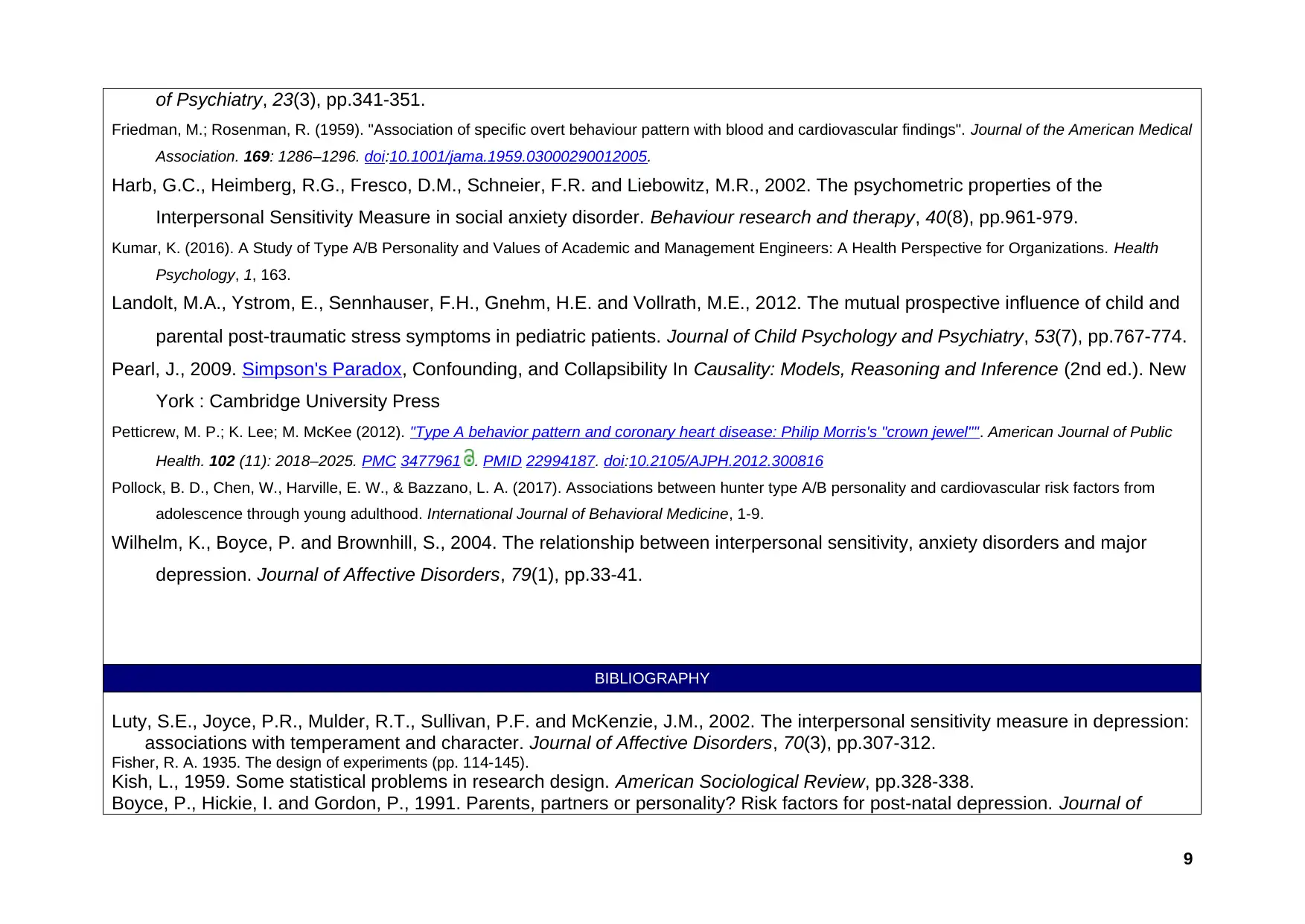
of Psychiatry, 23(3), pp.341-351.
Friedman, M.; Rosenman, R. (1959). "Association of specific overt behaviour pattern with blood and cardiovascular findings". Journal of the American Medical
Association. 169: 1286–1296. doi:10.1001/jama.1959.03000290012005.
Harb, G.C., Heimberg, R.G., Fresco, D.M., Schneier, F.R. and Liebowitz, M.R., 2002. The psychometric properties of the
Interpersonal Sensitivity Measure in social anxiety disorder. Behaviour research and therapy, 40(8), pp.961-979.
Kumar, K. (2016). A Study of Type A/B Personality and Values of Academic and Management Engineers: A Health Perspective for Organizations. Health
Psychology, 1, 163.
Landolt, M.A., Ystrom, E., Sennhauser, F.H., Gnehm, H.E. and Vollrath, M.E., 2012. The mutual prospective influence of child and
parental post‐traumatic stress symptoms in pediatric patients. Journal of Child Psychology and Psychiatry, 53(7), pp.767-774.
Pearl, J., 2009. Simpson's Paradox, Confounding, and Collapsibility In Causality: Models, Reasoning and Inference (2nd ed.). New
York : Cambridge University Press
Petticrew, M. P.; K. Lee; M. McKee (2012). "Type A behavior pattern and coronary heart disease: Philip Morris's "crown jewel"". American Journal of Public
Health. 102 (11): 2018–2025. PMC 3477961 . PMID 22994187. doi:10.2105/AJPH.2012.300816
Pollock, B. D., Chen, W., Harville, E. W., & Bazzano, L. A. (2017). Associations between hunter type A/B personality and cardiovascular risk factors from
adolescence through young adulthood. International Journal of Behavioral Medicine, 1-9.
Wilhelm, K., Boyce, P. and Brownhill, S., 2004. The relationship between interpersonal sensitivity, anxiety disorders and major
depression. Journal of Affective Disorders, 79(1), pp.33-41.
“BIBLIOGRAPHY”
Luty, S.E., Joyce, P.R., Mulder, R.T., Sullivan, P.F. and McKenzie, J.M., 2002. The interpersonal sensitivity measure in depression:
associations with temperament and character. Journal of Affective Disorders, 70(3), pp.307-312.
Fisher, R. A. 1935. The design of experiments (pp. 114-145).
Kish, L., 1959. Some statistical problems in research design. American Sociological Review, pp.328-338.
Boyce, P., Hickie, I. and Gordon, P., 1991. Parents, partners or personality? Risk factors for post-natal depression. Journal of
9
Friedman, M.; Rosenman, R. (1959). "Association of specific overt behaviour pattern with blood and cardiovascular findings". Journal of the American Medical
Association. 169: 1286–1296. doi:10.1001/jama.1959.03000290012005.
Harb, G.C., Heimberg, R.G., Fresco, D.M., Schneier, F.R. and Liebowitz, M.R., 2002. The psychometric properties of the
Interpersonal Sensitivity Measure in social anxiety disorder. Behaviour research and therapy, 40(8), pp.961-979.
Kumar, K. (2016). A Study of Type A/B Personality and Values of Academic and Management Engineers: A Health Perspective for Organizations. Health
Psychology, 1, 163.
Landolt, M.A., Ystrom, E., Sennhauser, F.H., Gnehm, H.E. and Vollrath, M.E., 2012. The mutual prospective influence of child and
parental post‐traumatic stress symptoms in pediatric patients. Journal of Child Psychology and Psychiatry, 53(7), pp.767-774.
Pearl, J., 2009. Simpson's Paradox, Confounding, and Collapsibility In Causality: Models, Reasoning and Inference (2nd ed.). New
York : Cambridge University Press
Petticrew, M. P.; K. Lee; M. McKee (2012). "Type A behavior pattern and coronary heart disease: Philip Morris's "crown jewel"". American Journal of Public
Health. 102 (11): 2018–2025. PMC 3477961 . PMID 22994187. doi:10.2105/AJPH.2012.300816
Pollock, B. D., Chen, W., Harville, E. W., & Bazzano, L. A. (2017). Associations between hunter type A/B personality and cardiovascular risk factors from
adolescence through young adulthood. International Journal of Behavioral Medicine, 1-9.
Wilhelm, K., Boyce, P. and Brownhill, S., 2004. The relationship between interpersonal sensitivity, anxiety disorders and major
depression. Journal of Affective Disorders, 79(1), pp.33-41.
“BIBLIOGRAPHY”
Luty, S.E., Joyce, P.R., Mulder, R.T., Sullivan, P.F. and McKenzie, J.M., 2002. The interpersonal sensitivity measure in depression:
associations with temperament and character. Journal of Affective Disorders, 70(3), pp.307-312.
Fisher, R. A. 1935. The design of experiments (pp. 114-145).
Kish, L., 1959. Some statistical problems in research design. American Sociological Review, pp.328-338.
Boyce, P., Hickie, I. and Gordon, P., 1991. Parents, partners or personality? Risk factors for post-natal depression. Journal of
9
⊘ This is a preview!⊘
Do you want full access?
Subscribe today to unlock all pages.

Trusted by 1+ million students worldwide
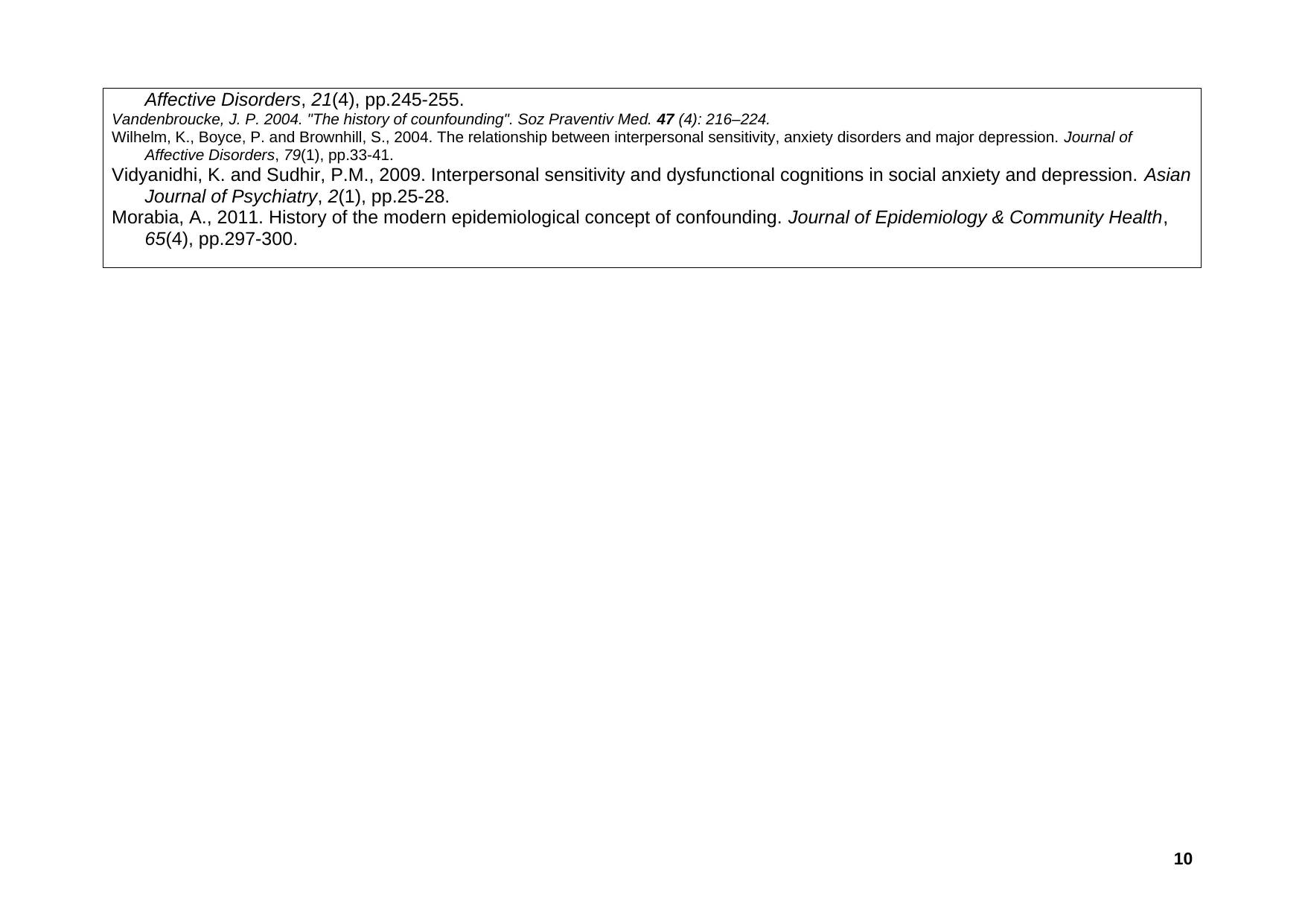
Affective Disorders, 21(4), pp.245-255.
Vandenbroucke, J. P. 2004. "The history of counfounding". Soz Praventiv Med. 47 (4): 216–224.
Wilhelm, K., Boyce, P. and Brownhill, S., 2004. The relationship between interpersonal sensitivity, anxiety disorders and major depression. Journal of
Affective Disorders, 79(1), pp.33-41.
Vidyanidhi, K. and Sudhir, P.M., 2009. Interpersonal sensitivity and dysfunctional cognitions in social anxiety and depression. Asian
Journal of Psychiatry, 2(1), pp.25-28.
Morabia, A., 2011. History of the modern epidemiological concept of confounding. Journal of Epidemiology & Community Health,
65(4), pp.297-300.
10
Vandenbroucke, J. P. 2004. "The history of counfounding". Soz Praventiv Med. 47 (4): 216–224.
Wilhelm, K., Boyce, P. and Brownhill, S., 2004. The relationship between interpersonal sensitivity, anxiety disorders and major depression. Journal of
Affective Disorders, 79(1), pp.33-41.
Vidyanidhi, K. and Sudhir, P.M., 2009. Interpersonal sensitivity and dysfunctional cognitions in social anxiety and depression. Asian
Journal of Psychiatry, 2(1), pp.25-28.
Morabia, A., 2011. History of the modern epidemiological concept of confounding. Journal of Epidemiology & Community Health,
65(4), pp.297-300.
10
Paraphrase This Document
Need a fresh take? Get an instant paraphrase of this document with our AI Paraphraser
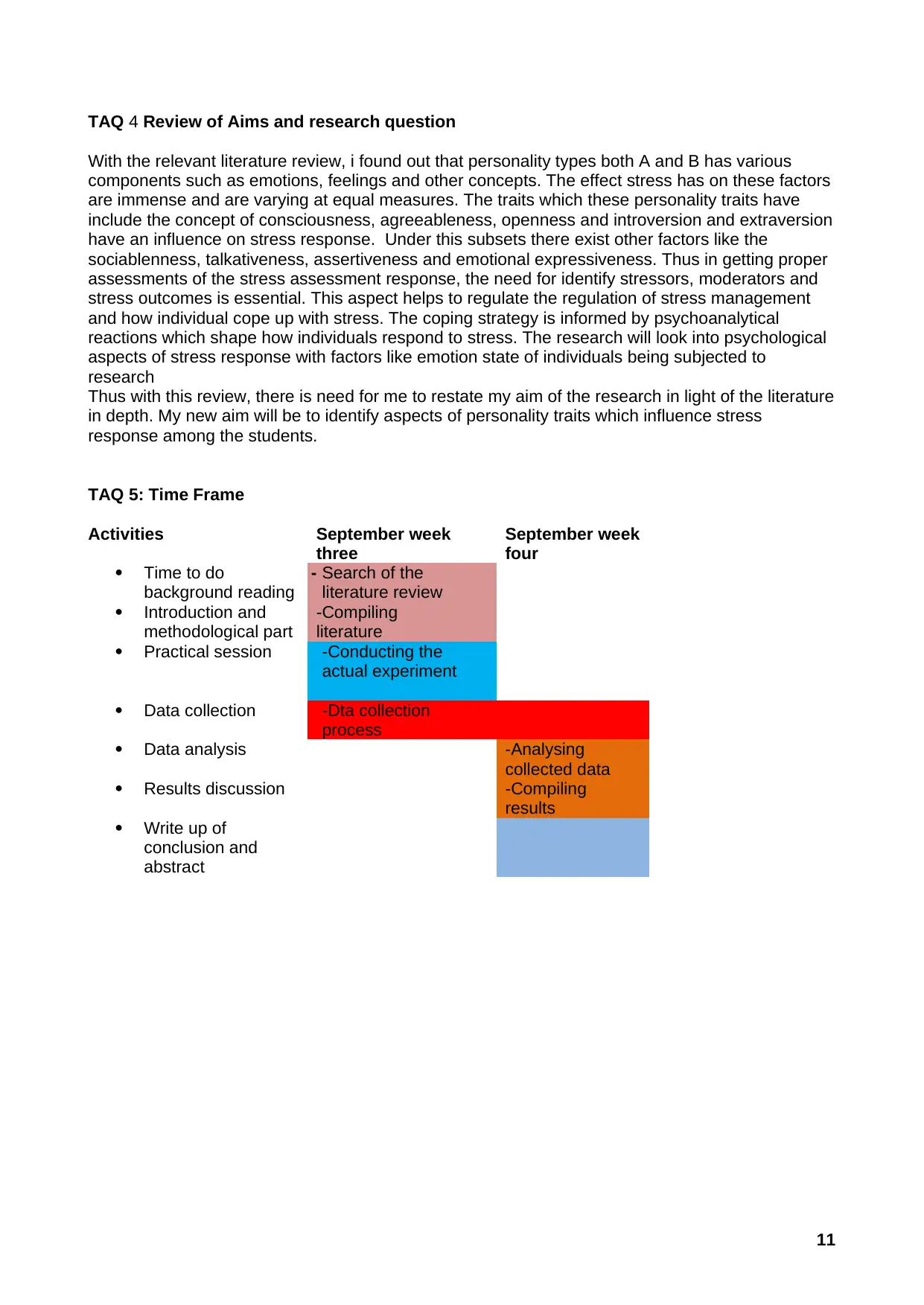
TAQ 4 Review of Aims and research question
With the relevant literature review, i found out that personality types both A and B has various
components such as emotions, feelings and other concepts. The effect stress has on these factors
are immense and are varying at equal measures. The traits which these personality traits have
include the concept of consciousness, agreeableness, openness and introversion and extraversion
have an influence on stress response. Under this subsets there exist other factors like the
sociablenness, talkativeness, assertiveness and emotional expressiveness. Thus in getting proper
assessments of the stress assessment response, the need for identify stressors, moderators and
stress outcomes is essential. This aspect helps to regulate the regulation of stress management
and how individual cope up with stress. The coping strategy is informed by psychoanalytical
reactions which shape how individuals respond to stress. The research will look into psychological
aspects of stress response with factors like emotion state of individuals being subjected to
research
Thus with this review, there is need for me to restate my aim of the research in light of the literature
in depth. My new aim will be to identify aspects of personality traits which influence stress
response among the students.
TAQ 5: Time Frame
Activities September week
three
September week
four
Time to do
background reading
- Search of the
literature review
Introduction and
methodological part
-Compiling
literature
Practical session -Conducting the
actual experiment
Data collection -Dta collection
process
Data analysis -Analysing
collected data
Results discussion -Compiling
results
Write up of
conclusion and
abstract
11
With the relevant literature review, i found out that personality types both A and B has various
components such as emotions, feelings and other concepts. The effect stress has on these factors
are immense and are varying at equal measures. The traits which these personality traits have
include the concept of consciousness, agreeableness, openness and introversion and extraversion
have an influence on stress response. Under this subsets there exist other factors like the
sociablenness, talkativeness, assertiveness and emotional expressiveness. Thus in getting proper
assessments of the stress assessment response, the need for identify stressors, moderators and
stress outcomes is essential. This aspect helps to regulate the regulation of stress management
and how individual cope up with stress. The coping strategy is informed by psychoanalytical
reactions which shape how individuals respond to stress. The research will look into psychological
aspects of stress response with factors like emotion state of individuals being subjected to
research
Thus with this review, there is need for me to restate my aim of the research in light of the literature
in depth. My new aim will be to identify aspects of personality traits which influence stress
response among the students.
TAQ 5: Time Frame
Activities September week
three
September week
four
Time to do
background reading
- Search of the
literature review
Introduction and
methodological part
-Compiling
literature
Practical session -Conducting the
actual experiment
Data collection -Dta collection
process
Data analysis -Analysing
collected data
Results discussion -Compiling
results
Write up of
conclusion and
abstract
11
1 out of 11
Related Documents
Your All-in-One AI-Powered Toolkit for Academic Success.
+13062052269
info@desklib.com
Available 24*7 on WhatsApp / Email
![[object Object]](/_next/static/media/star-bottom.7253800d.svg)
Unlock your academic potential
Copyright © 2020–2026 A2Z Services. All Rights Reserved. Developed and managed by ZUCOL.





